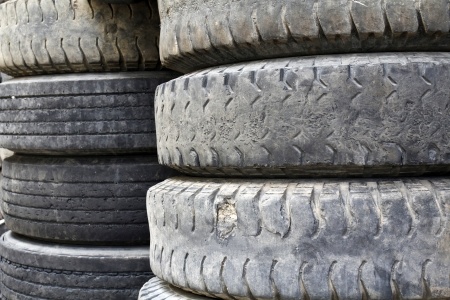Commercial Vehicle Tires Are Required To Be Maintained
October 7, 2015 | Category: Tire Failures | Share The three main expenses for commercial trucking fleets are tires, fuel and labor. Unfortunately, tires are frequently ignored. Ignoring tires causes the risk of accidents due to damaged or under-inflated tires.
The three main expenses for commercial trucking fleets are tires, fuel and labor. Unfortunately, tires are frequently ignored. Ignoring tires causes the risk of accidents due to damaged or under-inflated tires.
There have been too many accidents in Florida involving commercial trucks with damaged or faulty tires:
- A mother and her baby traveling on State Road 40 were killed on August 14, 2015 when a Volusia County dump truck collided head-on with their sport utility vehicle. FHP said the separation of the tire caused the dump truck to veer out of its lane as it headed west on State Road 40 near County Road 3 in Barberville. The truck crashed head-on into Potter's 1994 Ford Explorer.
- On August 27, 2015 a construction dump truck hit the rear left side of an Escambia County school bus, flipping the bus on its side and driving it into a power pole. During the investigation it was found that the truck tires were worn to the point of having almost no tread. Sixteen students were injured in the crash, and the Escambia County Superintendent issued a letter to the Compliance Investigation Unit of FHP (Florida Highway Patrol) requesting a thorough investigation of the fleet owned by G. B. Green Construction Management.
- WFTV in Deltona reported in April 2014 that a DeLand woman died in an accident when a dump truck drove through a guardrail causing the fatal four-vehicle crash on I-4 westbound. When investigating, FHP troopers said a front tire on the eastbound dump truck separated and the truck traveled through the guardrail and struck three cars traveling west.
NHTSA (National Highway Traffic Safety Administration) studies of tire safety show that observing tire and vehicle load limits (not carrying more weight in the vehicle than the tires or vehicle can safely handle), avoiding road hazards, and inspecting tires for cuts, slashes, and other irregularities are the most important things to do to avoid tire failure, such as tread separations, blowouts and flat tires.
Aren’t commercial vehicles regulated for safety?
Yes, the Federal Motor Carrier Safety Administration (FMCSA) imposes many duties on truck companies and truck drivers. One of those duties is the duty to maintain safe tires. Under the tire restrictions (§ 393.75 of FMCSA Safety Regulations), there are strict prohibitions on tires that cannot be used:
§393.75 Tires.
(a) No motor vehicle shall be operated on any tire that...
- Has body ply or belt material exposed through the tread or sidewall,
- Has any tread or sidewall separation,
- Is flat or has an audible leak, or
- Has a cut to the extent that the ply or belt material is exposed.
The rule outlines strict standards which involve what kind of tires can be used. These are:
- Tread groove: Under this rule, § 393.75(b), any tires used on the front wheels of a bus or truck shall have a tread groove that is at least 4/32 of an inch when measured from the tread groove.
- Tread measurement: 393.75(c) regulates all tires, saying that no tires, not even ones on the back wheels of a truck or bus, shall have treads less than 2/34 of an inch when measured from the tread groove.
- Regrooved tires: The rule also outlines regulations for regrooved tires. (According to Michelin Tires, regrooving is re-cutting a tread pattern once the tread depth has worn down to 3-4 mm.)
Commercial companies which own a trucking permit, under federal law, are responsible for all accidents which involve trucks that have the company name or placard displayed on the vehicle. Before any commercial truck is removed from an accident scene, federal and state regulations require they be inspected by a certified truck inspector (usually a member of the reconstruction division of the state police). The report issued as the result of the inspection will reveal the condition of all the important mechanical parts of the truck and trailer. The accident investigation report is not part of any local police report, but part of the governmental agency report.
Driving in Florida is a privilege, not a right, and everyone driving has a duty to drive safely and to avoid reasonable risks. Driving on extremely worn tires or with knowledge of a tire defect can open up the driver to liability in the event of an accident.
"We have seen the devastating results of being involved in an accident with a commercial truck, and have the expert team to assist the injured in these cases," said Fort Myers Truck Accident Attorney, Randall Spivey of Spivey Law Firm, Personal Injury Attorneys, P.A.
Fort Myers Truck Accident Attorney, Randall L. Spivey is a Board Certified Trial Attorney – the highest recognition for competence bestowed by the Florida Bar and a distinction earned by just one (1%) percent of Florida attorneys. He has handled over 2,000 personal injury and wrongful death cases throughout Florida. For a free and confidential consultation to discuss your legal rights, contact the Spivey Law Firm, Personal Injury Attorneys, P.A., in Lee County at 239.337.7483 or toll free at 1.888.477.4839,or by email to Randall@SpiveyLaw.com. Visit SpiveyLaw.com for more information. You can contact Spivey Law Firm, Personal Injury Attorneys, P.A.in Charlotte County at 941.764.7748 and in Collier County 239.793.7748.

